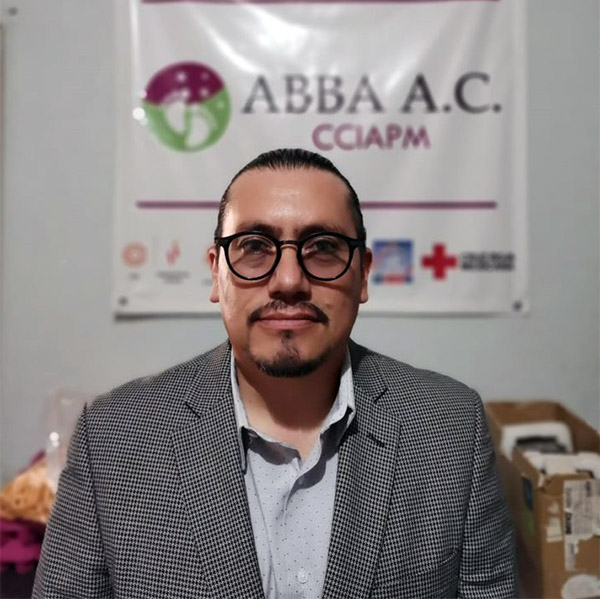Ignacio Martínez has a background in theological studies and is an evangelical pastor. In 2021, he graduated as a lawyer, driven by a desire to strengthen his work in defense of migrants’ rights. In 1995, Ignacio founded the Abba shelter in Celaya, Mexico. “I started as a pastor who gave food on the roads, and now I am a lawyer for the human rights of migrants,” Ignacio says. CWS has teamed up with Abba for years to welcome and serve tens of thousands of migrants passing through central Mexico.
Abba welcomes migrants with disabilities who have lost a limbs due to accidents on the railroad during transit. In the shelter, they provide physical and psychological rehabilitation. They also welcome migrant children who travel with their families or make migratory transit alone. Migrants from the LGBTIQ+ community are also welcomed.
We interviewed Ignacio to learn more about his work and motivation. This is that interview:
CWS: Why work with migrants?
Ignacio: For two reasons: My Christian formation and the experience we live as a family. First, I realize that God is interested in three types of population: widows, orphans and foreigners: that is, migrants. Celaya is an obligatory passage for migrants; it is the “golden gate of the Bajío,” an industrial corridor at the center of Mexico. But Guanajuato is also the third state to expel migrants, after Michoacán and Zacatecas, who send and live on remittances.
The other reason (the family) is that I have three brothers: one lives irregularly in the United States, and two more went there. One of them came to visit us, and when he returned, he was kidnapped. The person who was going to hire him in the United States paid the ransom. So we have a tough time in the family. I believe that we embody the migrant experience and the gospel message about this population so battered and needy in these times.
CWS: When did you decide to start with Abba? How did you imagine it?
Ignacio: We started with my wife and children, only giving food to the migrants on the train. And this grew to become a civil association. First, we rented a house, and began to serve migrants. Then, we acquired the property, and now we can purchase another one. For example, Haitian migrants are arriving in more significant numbers and the migratory flow, in general, is increasing. With the new immigration reform, which can no longer detain minors, you see entire families migrating.
CWS: How did you start offering legal and psychological counseling work and care for migrants with disabilities?
Ignacio: My philosophy of life is “we go where the wind takes us,” and in this case, it is the wind of the Holy Spirit. We are seeing how migration is dynamic and is making us sensitive to the needs of migrants. The model of care requires an attorney, and this is how decided to study law. I just finished in September 2021. We got the first case due to amputation, and after that, we established a relationship with the INGUDIS (Guanajuatense Institute for People with Disabilities). The ICRC (International Committee of the Red Cross) began a pilot service to serve a sector that no one serves: migrants with disabilities.
CWS: Why do you do advocacy?
Ignacio: The idea of political incidence arises because we see a political structure of government that is too unfair; there is no equity. From my theological vision, God seeks equality and equity. We see in Mexico the denial of opportunity to the poor and the migrants. This government and economic structure does not accommodate the poor; it expels them. Therefore, we need to show you with numbers and testimonies with fundamental and solid bases what you are not doing and what you are doing wrong.
CWS: How is Abba House linked with other initiatives?
Ignacio: Through REDODEM (Documentation Network of Organizations Defending Migrants), we have 23 shelters from Tapachula to Monterrey. We need support; we need a network, those other hands, and eyes to serve this vulnerable population. We must ask that they migrate in a dignified way. They come together to migrate with the caravans, but we see that they are vulnerable. And we must protect them.
CWS: How are the spiritual needs of migrants covered?
Ignacio: The mandate of love of neighbor leads us to the inclusion of all. Whether believers agree with me or not, Abba fulfills this service mandate. It is a human being with dignity. It seems that Mexico wants to pulverize the dignity of migrants. Some churches have criticized us for serving people from the LGBTIQ+ population. But we don’t care about these criticisms because we are interested in dignifying the people. Our call to embody the gospel message is this.
CWS: What is the future of Abba House?
Ignacio: We are expanding. In alliance with UNHCR, we acquired another property. We are building a shelter accessible to migrants with disabilities. In five years, I see a first-class shelter treating all basic needs, providing care for migrants with disabilities, facilitating access to safe employment for those who have achieved asylum and refuge.
Erwin Garzona is the CWS Regional Representative for Central America and Mexico. Monica Arango is the Communications and Advocacy Coordinator for our Latin America and the Caribbean team.

